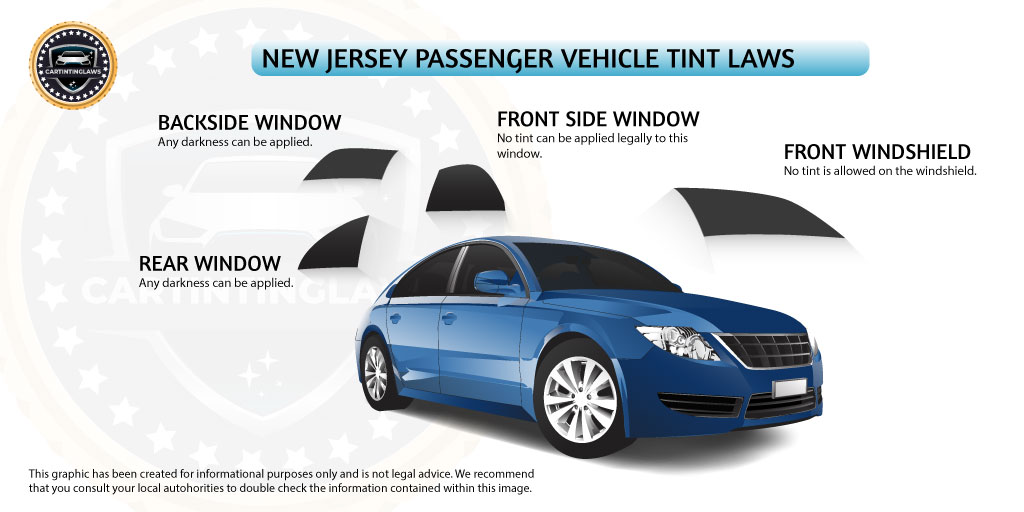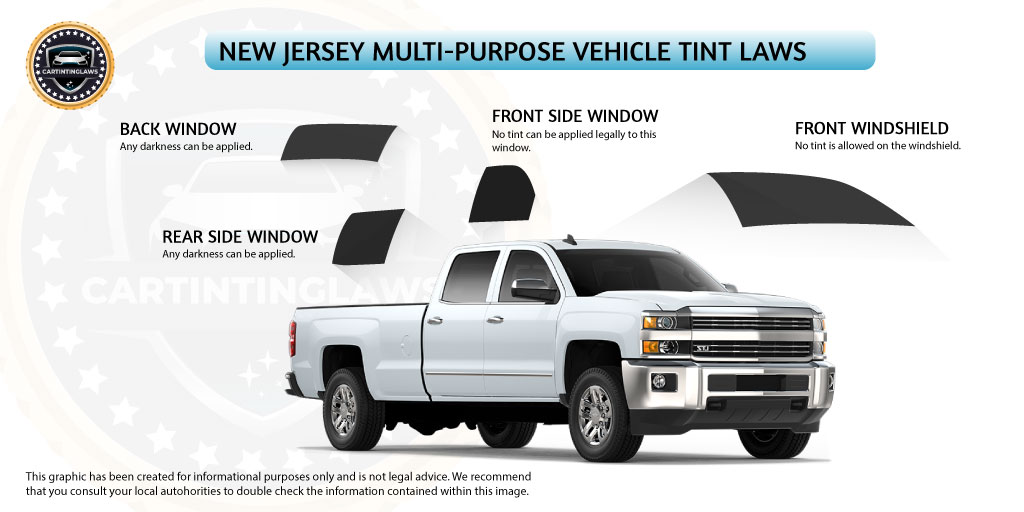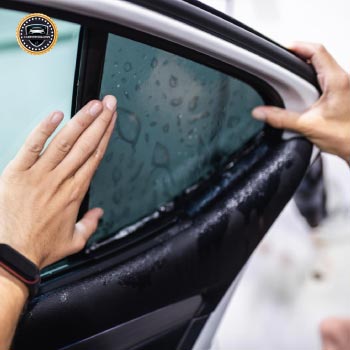Tint Laws in New Jersey: Understanding All the Regulations
Discover the legal window tint in New Jersey
Table of Contents
ToggleTinted windows on vehicles are subject to varying regulations in each state to prioritize safety and legal compliance. New Jersey, too, has its own specific laws concerning the acceptable levels of window tinting.
So, what are the tint laws in New Jersey? New Jersey has specific laws, rules, and restrictions concerning the darkness levels and types of tints allowed on different windows. From front side windows to rear windows, each section comes with distinct guidelines that motorists must adhere to.
This blog sheds light on New Jersey’s tint laws, providing a comprehensive overview of what is permitted and prohibited.
What Does VLT Mean According to New Jersey Law?
In New Jersey, there are specific regulations regarding the permissible VLT (Visible Light Transmission) percentages for window tint on different windows of a vehicle.
These regulations dictate how much light can be blocked by the window tint film, and they are typically expressed as a percentage.
For example, if the VLT limit is 30%, it means that the window tint can only block up to 70% of the visible light from passing through.
So, What is The Legal Tint in New Jersey?
The New Jersey Motor Vehicle Commission is responsible for enforcing the legal tint regulations in the state. Different rules apply to passenger cars and station wagons compared to multi-purpose passenger vehicles and recreational vehicles (RVs) when it comes to window tinting.
Let’s delve into the specific tint regulations for vehicles in New Jersey.
Tint Laws for Passenger Car and Station Wagons in New Jersey

The window tint laws for passenger cars and station wagons in New Jersey are as follows:
- Front Side Windows: Window tinting is not allowed, and the windows must have at least 70% Visible Light Transmission (VLT). This means that at least 70% of visible light must be able to pass through the window.
- Rear Side Windows and Rear Window: Window tinting is allowed, and there is no specific VLT requirement. However, the tint must allow more than 30% of visible light to pass through.
To summarize, for passenger cars and station wagons in New Jersey:
Front side windows must have at least 70% VLT (no tint allowed). However, rear side windows and rear window can be tinted, but the tint must allow more than 30% of visible light to pass through.
Note: Keep in mind that tint laws can change over time, and there may be additional regulations or exceptions.
Tint Laws for Multi-Purpose Passenger and Recreational Vehicles in New Jersey

In New Jersey, it’s crucial to follow these guidelines to avoid fines for illegal window tinting:
- Windshield: Tinting is not permitted on the windshield of both passenger and multi-purpose vehicles.
- Front Seat Side Windows: Tinting is not allowed on the front seat side windows of passenger and multi-purpose vehicles. Additionally, any metallic or mirrored reflections on these windows are also prohibited.
- Back Seat Side Windows: Passenger and multi-purpose vehicles cannot have metallic or mirrored reflections on their back seat side windows.
- Side Mirrors: If the back windows are tinted, it is mandatory to have dual side mirrors on the vehicle.
Following these regulations will help ensure that your vehicle’s window tinting is compliant with New Jersey law and prevent you from facing fines or penalties.
Remember to verify the latest window tint laws, as they can be subject to updates or changes over time.
Always refer to official sources, such as the New Jersey Motor Vehicle Commission (MVC) or consult with local law enforcement for the most current and accurate information.
Window Tint Reflection in New Jersey Window Tint Law 2023
The window tint reflection rules for both sedans and SUVs/Vans in New Jersey are as follows:
Tint Reflection for Sedans
- Front Side Windows: New Jersey law prohibits the use of window tinting that has metallic or mirrored reflections on the front side windows of sedans.
This means that any tint applied to the front side windows should not have a reflective or mirror-like appearance.
- Back Side Windows: For the back side windows of sedans, metallic or mirrored reflections are generally allowed.
This means that window tinting with reflective properties can be applied to the back side windows of sedans.
Tint Reflection for SUV and Vans
- Front Side Windows: Similar to sedans, SUVs and Vans are subject to the same rule. Tinting with metallic or mirrored reflections is not permitted on the front side windows of these vehicles.
- Back Side Windows: SUVs and Vans, like sedans, are allowed to have metallic or mirrored reflections on the back side windows. Tinting with reflective properties is generally acceptable on these windows.
What are the Window Tint Reflection Laws in New Jersey?
In New Jersey, there are specific regulations concerning the use of reflective tint on different windows of vehicles:
- Front Side Windows: The application of reflective tint on front side windows is not allowed. The law prohibits the use of tint that reflects a significant amount of light on these windows.
- Rear Side Windows: Reflective tint is permitted on the rear side windows of vehicles. This means that you can have a tint that reflects some amount of light on the rear side windows.
- Rear Window: New Jersey also allows the use of reflective tint on the rear window of vehicles. Similar to the rear side windows, you can apply a tint that reflects a certain amount of light on the rear window.
Other Window Tint Laws and Regulations of New Jersey You Need to Know
In New Jersey, window tinting is regulated by several important laws, rules, and regulations to ensure road safety and compliance. Let’s delve deeper into each aspect:
- Side Mirrors: If you choose to tint your back window, it is mandatory to have dual side mirrors on your vehicle.
This requirement ensures that drivers maintain adequate visibility of their surroundings, especially when the rear window might be darker due to tinting.
- Restricted Colors: Unlike some states that may explicitly ban certain colors of window tint, New Jersey law does not impose restrictions on the colors of tint that can be used.
However, it’s essential to bear in mind that excessively dark tints can still be subject to penalties, even if they are not of a specific color.
- Certificates: Film manufacturers are not required to certify the window tint they sell in New Jersey. This means that there is no formal approval process for window tinting products before they are sold in the state.
As a vehicle owner, it’s crucial to be aware of the permissible tint levels and choose products that comply with the state’s laws.
- Stickers: Unlike some other states that require special stickers to identify legal tinting, New Jersey does not have such a mandate.
However, this doesn’t exempt drivers from following the legal limits for tint darkness.
- Medical Exceptions: New Jersey recognizes medical exemptions for special window tint. This provision allows individuals with certain medical conditions to have window tints that deviate from the standard legal limits.
However, obtaining such an exemption requires adherence to specific terms and conditions outlined in New Jersey law. It’s essential for those seeking a medical exemption to follow the proper procedures to ensure compliance.
- Penalties: Non-compliance with New Jersey’s window tinting laws can lead to penalties. For a first offense, the maximum fine can reach $1,000. This penalty aims to discourage violations and encourage adherence to the regulations.
Repeat offenders face more severe consequences, with a maximum fine of $5,000 for subsequent offenses.
Tint Laws in New Jersey- FAQ’s
Is 5% tint legal in New Jersey?
No, 5% tint is not legal in New Jersey. The legal limit for tint darkness is 70% for the windshield and front side windows. The rear side windows and rear window can have any level of darkness as long as you have functional side mirrors.
Is 20% tint legal in New Jersey?
No, 20% tint is not legal for the front side windows and windshield in New Jersey. The legal limit for tint darkness is 70% for the windshield and front side windows. It may be allowed for the rear side windows and back window, but there are specific regulations for these windows as well.
Is 35% tint legal in New Jersey?
In New Jersey, 35% tint is permissible for both the front and rear side windows as the legal limit for tint darkness on these windows is 70%.
Is 50% tint legal in New Jersey?
Yes, 50% tint is legal for the front side windows and rear side windows in New Jersey. The state’s legal limit for tint darkness on these windows is 70%, so 50% tint was within the allowed range.
Is 75% tint legal in New Jersey?
75% tint is legal for the front side windows and rear side windows in New Jersey. However, verify the current regulations with the New Jersey Motor Vehicle Commission for the latest information
What is the legal window tint in New Jersey
In New Jersey, the legal window tint varies based on the specific window’s location on the vehicle. Different regulations apply to the front side windows compared to the rear side windows, back window, and windshield.
What is the darkest legal tint in New Jersey?
In New Jersey, the maximum allowable tint darkness depends on the specific window and its location on the vehicle. Rear windows are permitted to have darker tints in comparison to front windows and the windshield.
How much is a tint ticket in New Jersey?
The cost of a tint ticket in New Jersey can vary depending on the specific circumstances and the issuing officer’s discretion. Typically, a tint violation ticket can range from around $54 to $150.
Most Important Information about Car Window Tinting
Bottom Line
Tint laws in New Jersey aim to prioritize road safety and visibility. These regulations are similar to those in other states and are essential for vehicle owners to grasp to avoid penalties and ensure full compliance.
Understanding these laws is crucial for enjoying the advantages of window tinting while keeping the roads safe for everyone. By following these guidelines, drivers can benefit from tinted windows while staying within the boundaries of the law.



